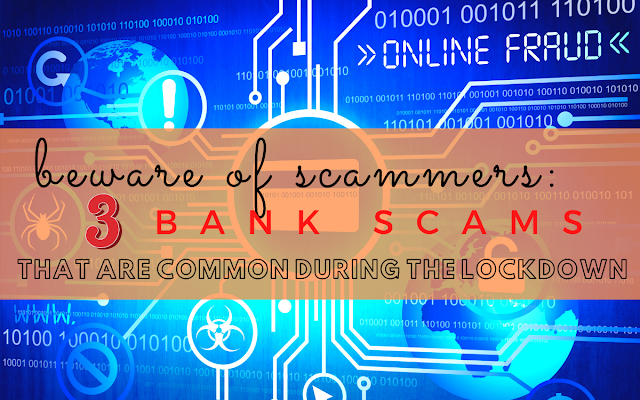Due to the government-imposed lockdown and the prevalent use of online banking channels, cybercriminals are on the loose again. They are becoming more clever and sophisticated in carrying out their evil schemes.
From an email that looks like it came from your legitimate bank or a phone call from a fake call center agent threatening you to block your credit card if you will not respond promptly for account verification, these online crimes are generally hard to monitor and prosecute the culprit.
But, how does bank scam happen?
There is only one requirement for bank scam to happen – your banking credentials. These are your username, password, account numbers, and One-Time Password (OTP).
How about, if the scammer has your account number only?
There is nothing that the scammer can do with just the account number.
The fraudster should have all your banking credentials for every successful scam to happen.
Then, the scammer can withdraw, transfer funds from your account or used up the credit limit of your credit card.
Knowing the nature of bank fraud and how scammers carry out their scheme, we avoid ourselves from losing our hard-earned money.
In this post, we will discuss the nature of bank frauds and how these are being done by criminals.
Nature of Bank Fraud
1. Skimming
Card skimming is the illegal process of copying financial information from the magnetic strip of an ATM or credit card.
Bank scammers will create a fake card with your details on it. Then, they will withdraw or make purchases using the cloned card.
Sometimes, scammers go to the extent of copying your personal details and account numbers and borrow money or take out loans in your name.
2. Phishing
Phishing is the unauthorized collection of financial details by sending legitimate-looking emails or the creation of replicas of valid web pages, which will be used to steal money from the victim’s account.
Common Bank Fraud
Recently, there are many reported cases of bank fraud on the internet. I can relate how it feels to experience having your card details compromised.
So, before we become victims of bank fraud, let us know how these fraudsters conduct their criminal intent to their potential target.
There are three ways they conduct their business, thru emails, call or text message, and the most recent one – SIM swap.
The purpose of the scammer is to get your personal data. Then, they can steal money from your account.
1. Fake Email
The scammer will send an email requesting the victim to verify his account through a link that opens up to a fake bank website.
The reasons for the account verification are varied – suspicious activity, confirmation of registered mobile number, or transaction alerts, etc. Usually, the tone of the email is threatening and urgent.
2. Fake Call/Text Message
The scammer sends a text message or calls the target, to trick him into believing that someone else used his card to purchase something expensive.
Then, he will ask for your credit card number, the CCV found at the back of the card, the expiry of the card, and the One-Time-Password (OTP).
There are other variations of the nature of the call, but the aim is to get the victim’s account credentials.
3. SIM Swap
The fraudsters will disguise as telco agents offering SIM Card upgrades. They will take the victim’s SIM card which they will use to access his online banking account to withdraw or purchase from the victim’s account.
Our money in the bank may not be safe anymore. Many scams take place over the internet, making them hard to trace and prosecute.
PIN THIS FOR LATER
This is further aggravated by the Data Privacy Act, which prohibits institutions to divulge account information without the necessary court order, making it hard for the concerned parties to get the data needed for an investigation.
We need to be wary of people asking us for our personal and financial information. Fraudsters are everywhere and they are just waiting for the right timing to conduct their modus operandi. We do not want to be the next target.
PIN THIS FOR LATER.







Ugh. I hate the thought of scammers. I have only been there once. THANKFULLY, but I am fully prepared with knowledge incase it happens again. Thanks for reminding people to look out for their finances!
Getting scammed is the most frustrating experience ever. One minute you are living your life as you please and then everything just pauses.
I'm so glad that there are people who are sharing bank scams so we can all be aware of so that we can avoid it.
I've noticed a TON of phishing email scams lately!! I keep warning all of my family members!
Ok. Now this is scary. Too much stress for the night. Only an open mind and clarity could save us. Thanks for sharing.
oh wow this is indeed very useful and helpful blog post..Thanks for sharing such valuable information..this is really very interesting to know more about..
It is so frustrating to me that people are willing to do these things to others, knowing that it can destroy their lives.
I never react to those kind of emails – you can never be too careful 🙂
Wow this is such good information to know!
This is very timely nowadays Scammers are everywhere you need to be careful on your online transactions well I always to change my password on ATM card for my security purposes nice tips from you!
It is important to be aware of scammers and the dangers they pose, thanks for this reminder! Glad you shared these with us.
I am sure these is very helpful. Thank you for sharing this reminder to always make sure to check every move we make online or even just picking up the phone call.
This just makes me so mad. Times are hard enough without people trying to steal money.
I used to work in finance and the amount of scams going about at the minute is terrible! Hopefully people will be careful and avoid them.
These are very helpful tips! Sometimes we feel like we are informed well about this things but people can still easily get scammed with all these legit looking emails and stuff.
I hadn't heard of any of these! It's great to be informed.
It seems like the financial repercussions of the lockdown has impacted all over the world. Just this morning I received a notification from my bank to secure my account.
This is very very useful! I, on a humanitarian level, don't understand that how people are still out there, taking advantage of such a grave global pandemic situation.!
Ugh, so scaaarrry! When our money is not safe with the banks anymore, what could we do then huhu. Banks should also do something about these scams!
Norway rats live throughout the 48 contiguous United States.הדברת יתושים